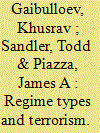| Srl | Item |
| 1 |
ID:
098999


|
|
|
|
|
| Publication |
2010.
|
| Summary/Abstract |
Previous studies nearly unanimously agree that civil conflicts are more likely to occur in semi-democracies than in either autocracies or democracies. Through multinomial regression analysis, this article re-evaluates this claim by testing the relationship between regime type and civil conflict for the post-Cold War period. Controlling for the material wealth of a country, the heterogeneity of the population, income inequalities and the size of the state, this research finds that the occurrence of minor intrastate wars (25 to 1000 deaths) and major civil wars (more than 1000 deaths) does not differ between hybrid regimes and autocracies. Only democracies have a significantly lower probability of experiencing intrastate fighting and warfare.
|
|
|
|
|
|
|
|
|
|
|
|
|
|
|
|
| 2 |
ID:
154542


|
|
|
|
|
| Summary/Abstract |
Regime type has opposing effects on terrorism. If a regime constrains the executive branch, then terrorism may be more prevalent. If, however, a regime allows all viewpoints to be represented, then grievances may be held in check, resulting in less terrorism. Regimes that value constituents’ lives and property will also act to limit attacks. We formulate a game-theoretic model, containing a terrorist group and targeted government, that captures these opposing forces and supports a nonlinear relationship between regime type and terrorism. This model indicates how diverse samples in the literature can result in different relationships between regime type and terrorism. Seldom does it support the positive relationship that is prevalent in the terrorism literature. We apply a large variety of empirical techniques to show that regime type has a robust inverted U-shaped impact on various terrorism measures. Foreign policy variables (e.g., alliance with the United States) are not a robust influence on terrorism.
|
|
|
|
|
|
|
|
|
|
|
|
|
|
|
|